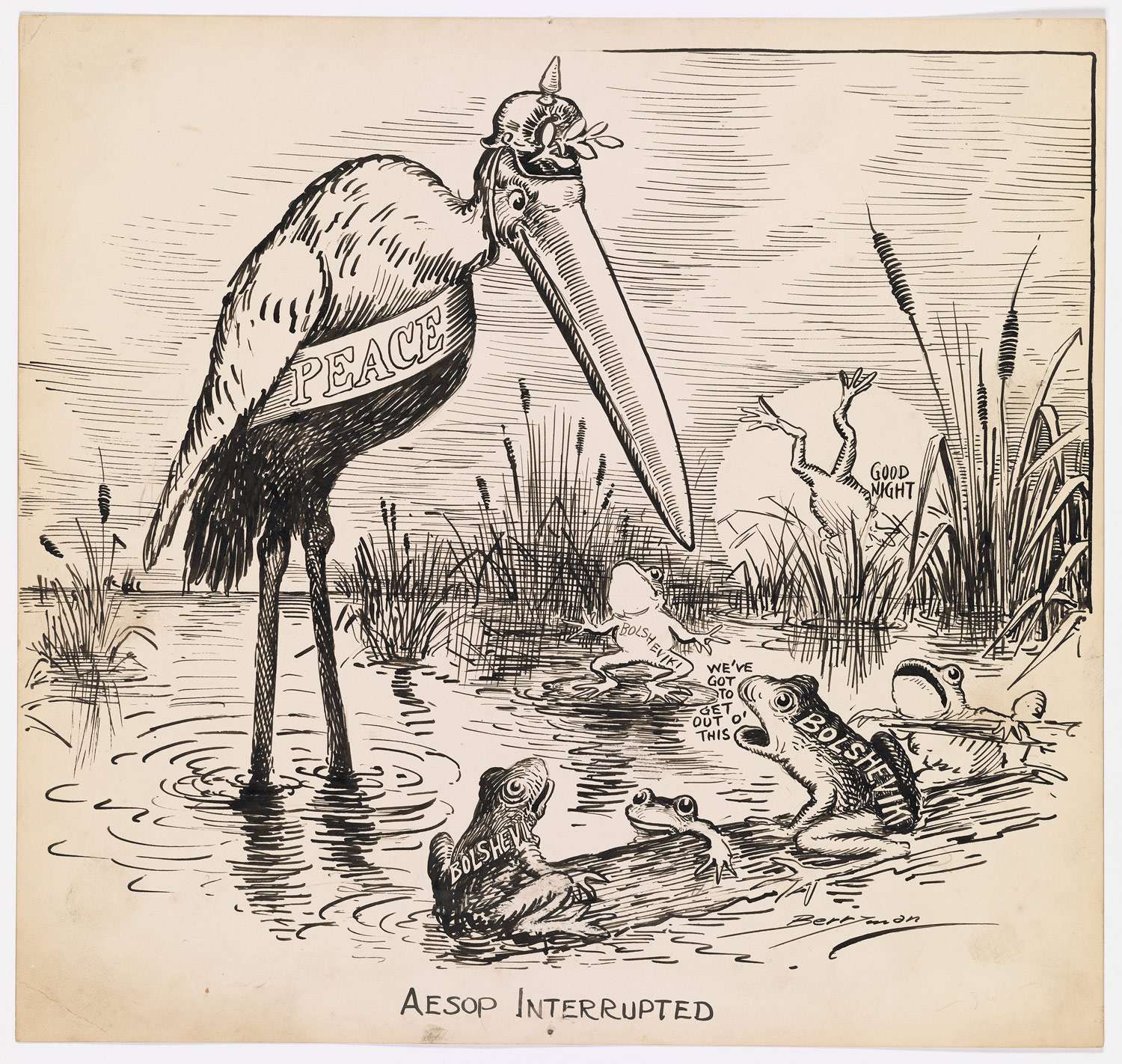Aesop Interrupted
1/8/1918
Add to Favorites:
Add all page(s) of this document to activity:

This allegorical cartoon alludes to an Aesop’s fable about frogs who ask Zeus for a king. First, Zeus gives them a log as king, and when they complain, he sends a new king, a stork who eats them.
The cartoon frogs are labeled “Bolsheviki.” A moderate provisional government took over in Russia in 1917 after the tsar was overthrown; however, the Bolsheviks overthrew this government later that year. The new communist government asked Germany for peace. The stork, wearing a military helmet and a sash and bearing an olive branch, represents the Germans. Germany convened peace talks in Brest-Litovsk in December, 1917.
This cartoon suggests that the Russians should pull out of the negotiations, reflecting sentiment expressed in a speech given the previous day in which President Woodrow Wilson outlined peace terms favorable to the Russians and harsh to the Germans. The cartoon is implying that the Russians should wait for a better deal. Russia signed the Treaty of Brest-Litovsk a month later, ending their involvement in the war and surrendering a great deal of territory to Germany.
This cartoon was drawn by Clifford Berryman, one of Washington, DC's best-known cartoonists in the early to mid-1900s. Berryman drew for the Washington Post and Evening Star newspapers. His cartoons touched on a variety of subjects including politics, elections, and both World Wars.
This cartoon is featured in America and the World: Foreign Affairs in Political Cartoons, 1898–1940, a free PDF book from the Center for Legislative Archives at the National Archives.
The cartoon frogs are labeled “Bolsheviki.” A moderate provisional government took over in Russia in 1917 after the tsar was overthrown; however, the Bolsheviks overthrew this government later that year. The new communist government asked Germany for peace. The stork, wearing a military helmet and a sash and bearing an olive branch, represents the Germans. Germany convened peace talks in Brest-Litovsk in December, 1917.
This cartoon suggests that the Russians should pull out of the negotiations, reflecting sentiment expressed in a speech given the previous day in which President Woodrow Wilson outlined peace terms favorable to the Russians and harsh to the Germans. The cartoon is implying that the Russians should wait for a better deal. Russia signed the Treaty of Brest-Litovsk a month later, ending their involvement in the war and surrendering a great deal of territory to Germany.
This cartoon was drawn by Clifford Berryman, one of Washington, DC's best-known cartoonists in the early to mid-1900s. Berryman drew for the Washington Post and Evening Star newspapers. His cartoons touched on a variety of subjects including politics, elections, and both World Wars.
This cartoon is featured in America and the World: Foreign Affairs in Political Cartoons, 1898–1940, a free PDF book from the Center for Legislative Archives at the National Archives.
This primary source comes from the Records of the U.S. Senate .
National Archives Identifier: 6011326
Full Citation: Cartoon V-061; Aesop Interrupted; 1/8/1918; Berryman Political Cartoon Collection, 1896-1949; Records of the U.S. Senate , Record Group 46 ; National Archives Building, Washington DC, 20408. [Online Version, https://docsteach.org/documents/document/aesop-interrupted, April 26, 2024]Rights: Public Domain, Free of Known Copyright Restrictions. Learn more on our privacy and legal page.



